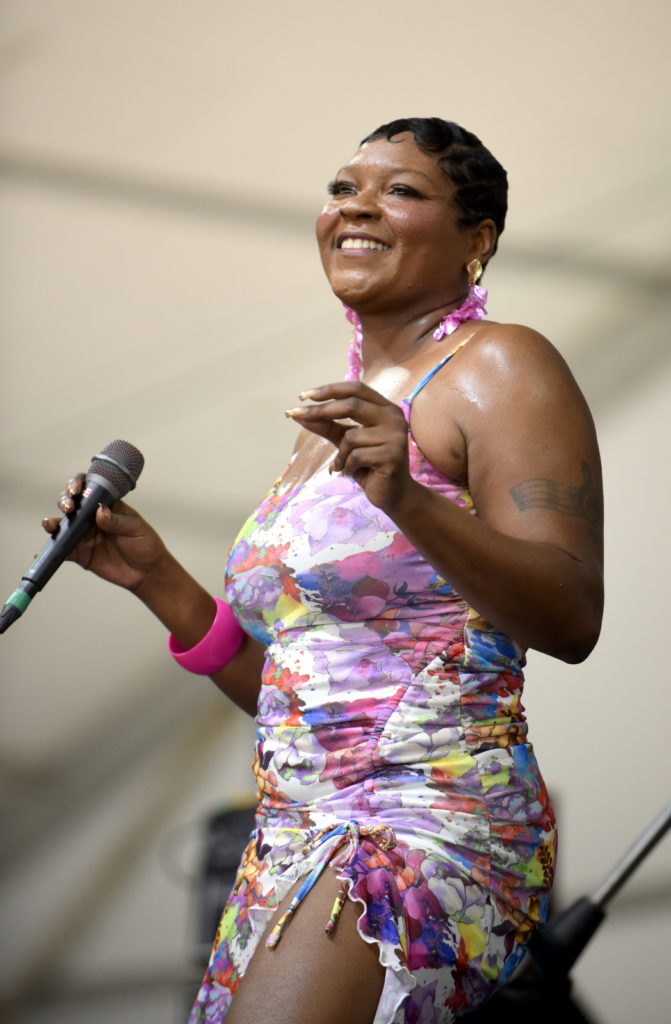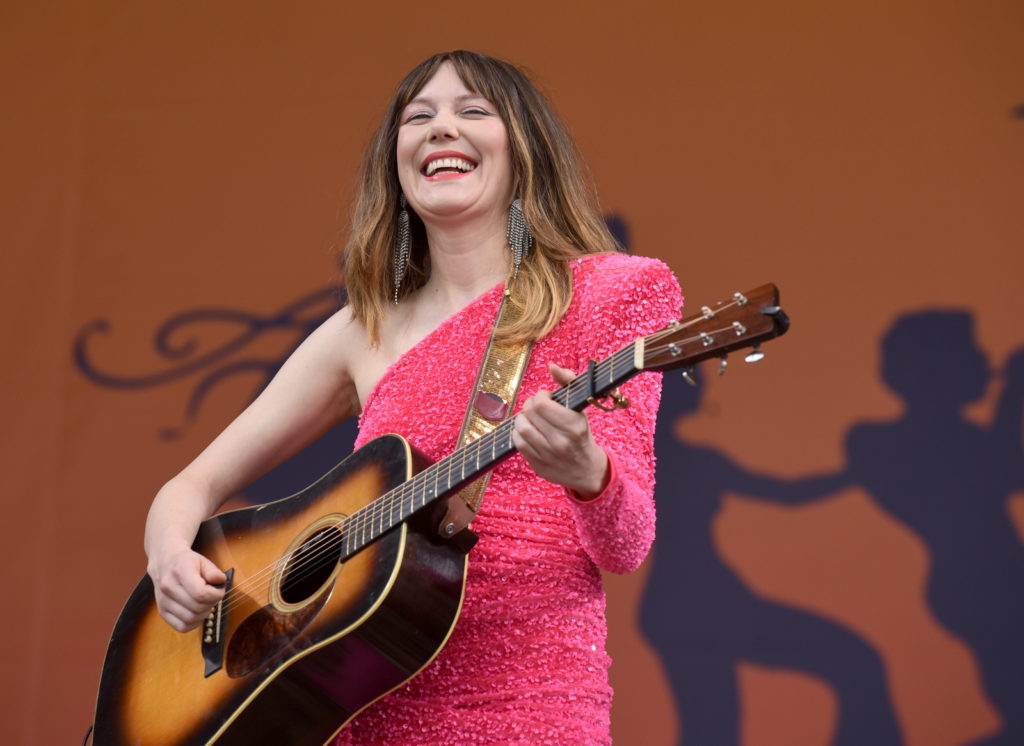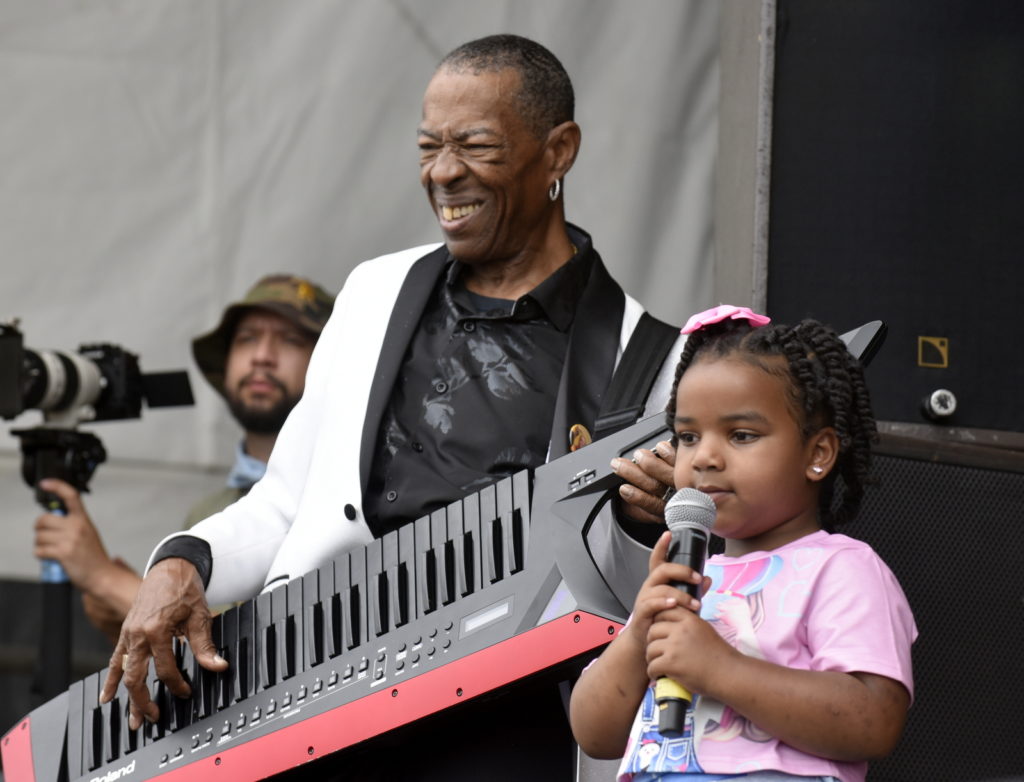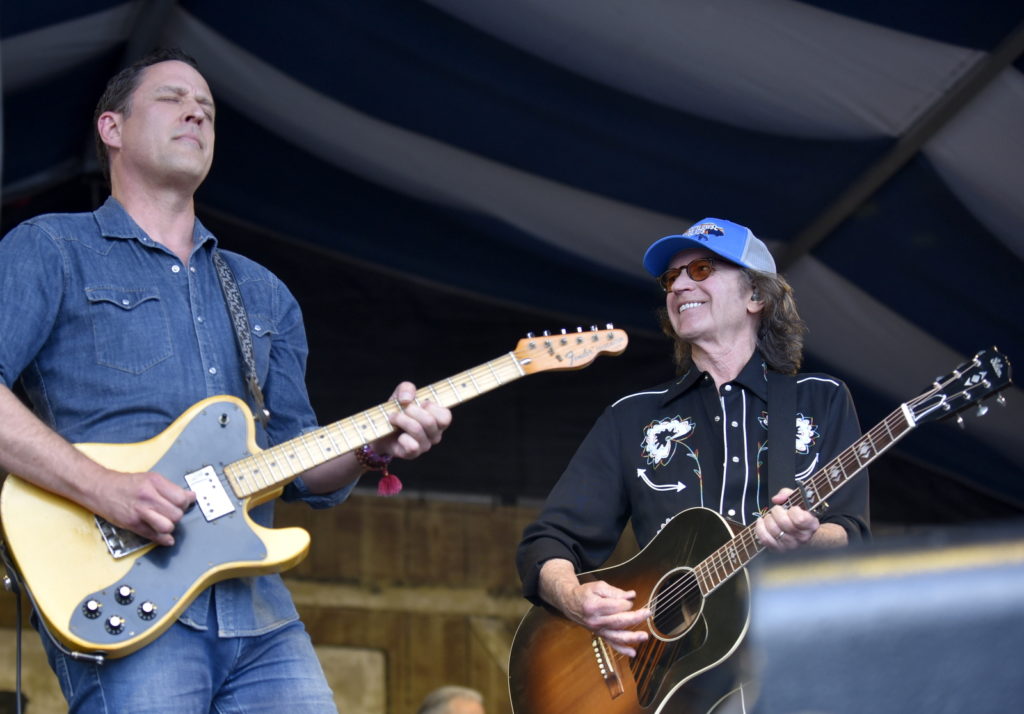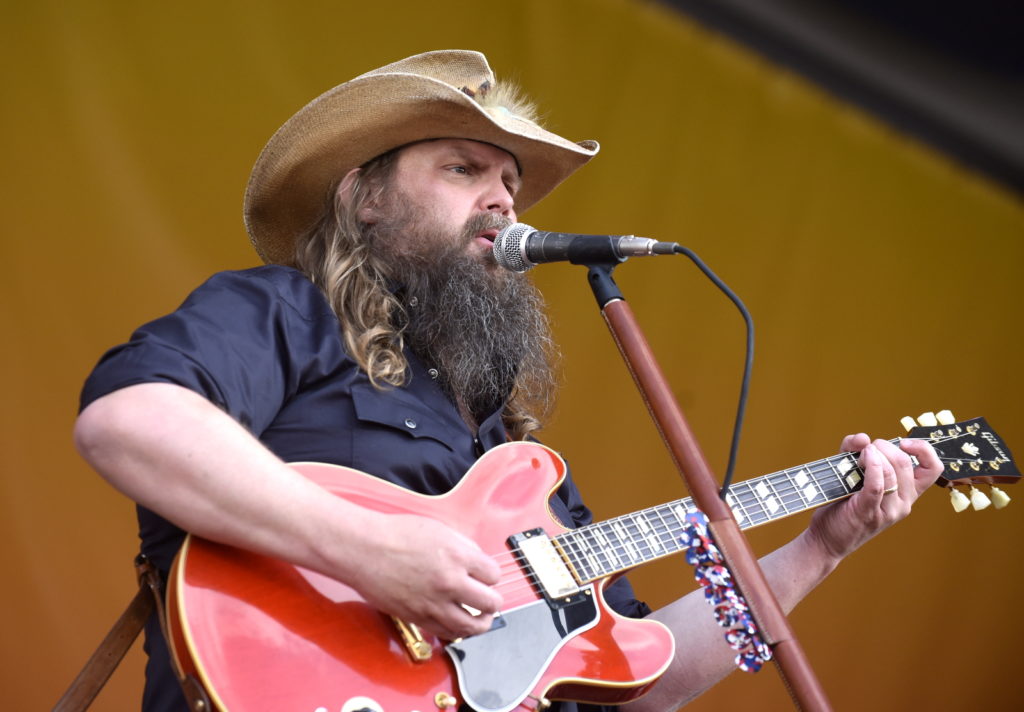It’s Jazz Fest Day 3, and as any Jazz Fest veteran knows that when the weekend comes, the attendees increase, so it’s often best to eat popular items early to avoid lines. Also, it will take longer to get stage to stage, so plan accordingly. Armed with a Crescent City Citrus Parade mocktail from 1 Million Strong / Tap Truck, I eagerly made my way to the Gentilly Stage for People Museum.
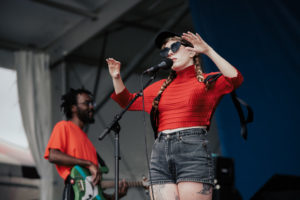
People Museum. Photo by OffBeat / Noé Cugny
People Museum by broad daylight is an interesting notion. How would they come off? Southern Gothic in the sun. The big sky was overcast, so that helped a bit, but ultimately the answer was clear once they kicked off strong with “Back To Myself” attired in red, black, and white. By the time singer Claire Givens sang the chorus “Let me love you, baby” of the next song, the crowd was fully in, and enthusiastic. The power of exceptional brass duo— trombonist Jeremy Phipps and sousaphonist / bass player Charles Lumar II—got an extra kick with added saxophone for “Butterfly.” Versatile drummer Aaron Boudreaux filled out this supergroup-of-sorts that largely played from their superb groundbreaking album Relic.
Other particularly wonderful moments were Givens’ and Phipps’ vocal-and-trombone call-and-response on the Twin Peaks-esque “All I Need,” Boudreaux’s crisp forcefulness during “Magnolias Meet Me,” and Lumar rocking to the fuzzed-out riff of “Relic.” By the time the band closed out the set with “And we float on the dance floor,” from “Saturn Rings,” the blissed-out audience was indeed floating on green grass. Let’s hope by next year People Museum are booked to perform later in the day. Their talent and inventive uniqueness create instant fans just through visibility of their music.
To me, it’s a waste of Jazz Fest time to eat anywhere but while at a music stage. I’ll leave tables for others. The move was to get the Trout Baquet at Lil Dizzy’s Café, in the Heritage Square Food area and take it to the WWOZ Jazz Tent to catch Sierra Green. Restaurant co-owner Arkesha Smith-Baquet confirmed my choice by saying, “We’ve sold a lot at Jazz Fest over at least 30 years, but in recent years the Trout Baquet is our number one seller.”
It’s not only that my palate was happy by the fish topped with crab meat when I say that Sierra Green is the real deal, and The Giants are no lie. The new single “Can You Get To That” was a triumphant entrance and call to arms that Green’s classic soul sound and big voice are right at home—no matter the stage. Her powerful rendition of “Promised Land” by The Revivalists lifted the roof. Each song showcased the talents of The Giants, with the through line that we knew Green was about step up strong at any second.
A couple things heard after this were Amis du Teche ripping and harmonizing with urgency on the Fais Do Do stage, and a likely Jazz Fest first-timer calling out, “Hey look! They have a Wowz Mango Freeze,” misunderstanding, of course, the call letters WWOZ.
We all knew the next set was coming, but the Batiste Brothers Tribute to Russell Batiste at the Congo Square Stage still stung. One can only surrender to the perfect good time music, and ultimately, if loving it is wrong, you don’t want to be right. Singer Andrew Joseph had the perfect raspiness to stress, “Louisiana is my birthplace.” Russell’s father David Batiste donned his keytar and rocked the ship, seeing how low the crowd could go. The group included Paul Batiste, he of the tasteful guitar parts, strong veteran Peter Batiste on keys and vocals, his daughter Quanna Batiste, and more.
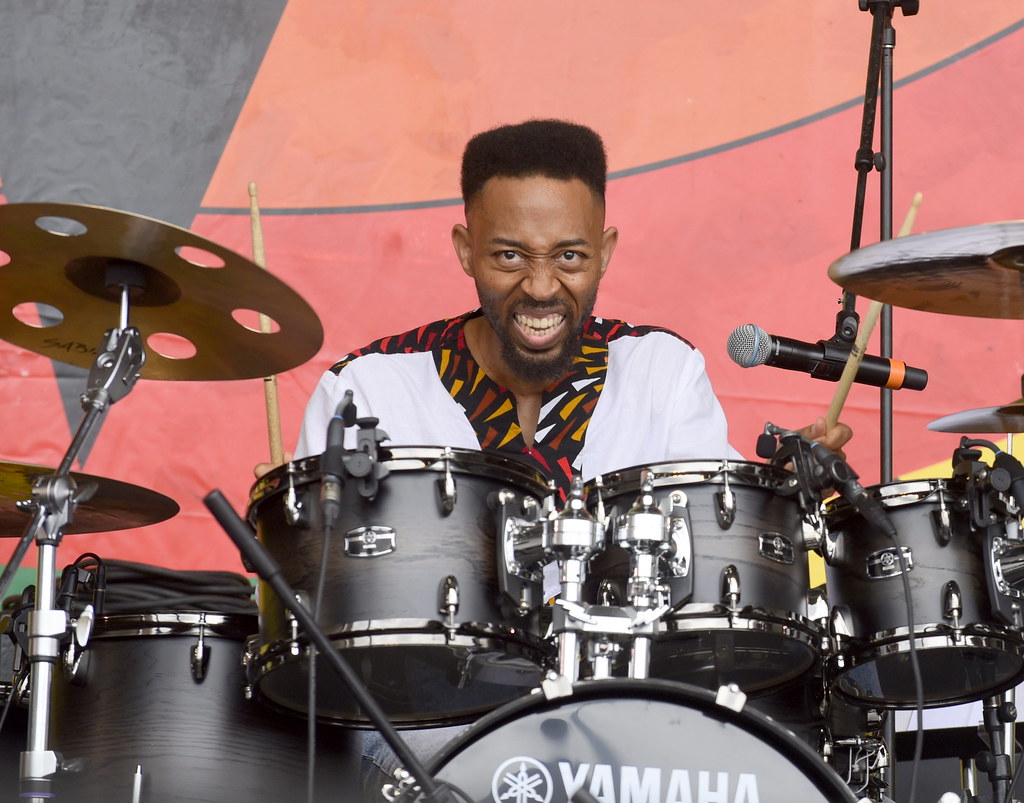
Jamal Batiste. Photo by OffBeat / Kim Welsh
Next up was “It’s All About The Family” from the rare and funky album Freeze. In addition to the brothers themselves, Jamal Batiste handled drums and MC, while Ryan “Shaggadelic” Batiste was on keys. As the group worked through “Groove Me,” “Mustang Sally” (with Jamal’s drumming updating the song to today) and a medley that included “Fire on the Bayou,” “Meet the Boys on the Battlefront,” “Liza Jane,” and “Down By The Riverside,” a crowd favorite emerged—six-year-old Nevaeh Baksh on vocals and shakers. Her grandfather David Batiste made sure to emphasize, “We started like this,” to make it clear she was there to carry on tradition same as the Batiste Brothers and their children had themselves done, not for cuteness points.
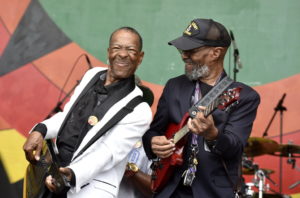
Batiste Brothers. Photo OffBeat/Kim Welsh
It was back to the WWOZ Jazz Tent for another awaited set with a food stop steps way for a personal favorite, Ba Mien’s Shrimp Vermicelli. Owner Mai Nguyen always delivers the goods with tasty and light fare whether at Jazz Fest or out in the Versailles neighborhood.
Victor Campbell had his debut performance today. Considering his steep music evolution in just the past year, I suspect that in decades ahead, people will make it known they were in attendance today. Before this show, I might have described his sound as “a Cuban James Booker,” meaning that as a high compliment. Even considering that Campbell has had bolero night, a Timba group, and several other styles, I was still surprised by what he pulled out of his hat.
What we witnessed today was something new and stunning, like a mountain you didn’t realize was around the corner. The journey in song over the hour-long set was a true marvel, both melodic and powerful. Campbell says, “I don’t play music, I pray music,” and he presented a prayer of the destruction of conceptions with a reconstruction of mind and soul expansion.
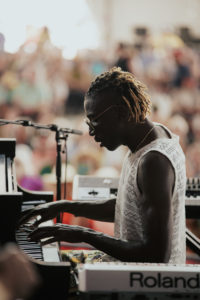
Victor Campbell. Photo by OffBeat / Noé Cugny
The exceptional group that brought his vision to life included Jafet Perez on drum kit and David Navarro on trumpet. They covered a range of music styles, including blends they themselves seem to have built in the lab. Campbell made sure to give the audience some New Orleans with a tribute to Professor Longhair, Ellis Marsalis, and others. The ’70s funk jam was exceptional, what with wah guitar and each subsequent instrumentalist taking turns jamming with Campbell. Ultimately, they closed out with “James Booker in Havana,” a crowd favorite, and the attendees rose to their feet for what had happened over the previous hour.
I want you to understand. I have seen Victor Campbell perform in various incarnations but still didn’t know this was coming. It’s now clear. The sky’s the limit for Campbell, and it’s a big sky out there.
—Michael Allen Zell
Molly Tuttle & Kyle Tuttle. The bandmates, who say they are not actually related, took the stage (Molly on acoustic, Kyle on banjo) at the Alison Miner Music Heritage State without a plan. “Should we do ‘El Dorado’?” she asked him. “You can tell we’re really prepared.”
Later, interviewed by Mollie Farr, Kyle said of the 2021 album recorded in the midst of the pandemic: “Jerry Douglas produced the record, so we got to move into the studio for about 14 days.” That was a great plan for the budding band, which first grew roots when the members met at Berklee College of Music. That band is now known as Molly Tuttle & Golden Highway, a multi-Grammy-winning bluegrass sensation headed by perhaps the most exciting and accomplished guitar player around.
Molly was the only woman in music class—always—and endured weird comments and being awkwardly singled out by teachers. Tuttle’s father was musically inclined, too. He moved to the Bay Area during the bluegrass revival and ended up as a teacher of the banjo (and the genre generally) for over four decades now. Molly thought she would follow him if she couldn’t make money– just so long as she “didn’t have to go to real college,” she said, to the audience’s laughter. Of bluegrass today, she agreed that people have “preconceived notions” about the music, but there are “all these different avenues now and, with the internet,” she adds, “there’s more ways to discover” it.
Kyle, Molly says, is “kind of like a punk rock banjo player”—he listened to Crass and Anti-Flag early on, but loves Cajun music, especially Jo-El Sonnier. He started in the music world at 15, and played electric guitar in punk bands before switching to banjo, which he’s since mastered.
The duo then played “our punk rock cover,” Rancid’s Washington-state ode “Olympia,” one of the great modern-day cover songs. “You can do all these punk songs on acoustic guitar. They’re all the same chords,” she adds with a laugh.
At their main stage set later that afternoon, the full band electrified the crowd with their originals and stunning covers of the Stones’ “She’s a Rainbow” (“We got any Rolling Stones fans here?” she asked the crowd, which is waiting for Thursday’s headlining appearance by that band) and Jefferson Airplane’s “White Rabbit.”
The Batiste Brothers’ tribute to Russell Batiste. The Bastistes’ show on the Congo Square state was a family affair—with a heavy emphasis on “family.” “Family is important,” they reminded us between their originals “Louisiana” and “It’s About Family.” David Russell Batiste, Sr. (recently honored with a Lifetime Achievement Award in Music at OffBeat‘s Best of The Beat Awards) and his brothers repeatedly reminded us of the recently deceased nephew’s ability to get the crowd fired up, too. Although Jon Batiste—whom many attendees undoubtedly hoped would appear—was not present, seemingly every New Orleans musician with his last name appeared here, including a pre-schooler on maraca. The family kept the crowd on their feet for their full set, running through funk classics like “Groove Me” and spirituals like “Down by the Riverside,” right up until the band cut the show short, 17 minutes before its scheduled end. Perhaps with a series of snippets of songs and medleys, they’d simply exhausted everything they’d rehearsed.
Hurray for the Riff Raff. Singer-songwriter Alynda Segarra has become an indie folk/rock star over the past decade or so, thanks to a brilliant series of records that includes the masterful concept album, The Navigator and their latest, February’s The Past is Still Alive, a tribute to their late father. The set was lyrically and vocally subdued, in keeping with the new album’s tone, but melodically robust and hard-driving too, especially on 2022’s “Rhododendron.” Those not paying attention to the arresting lyrics jumped a bit at the verse in the brilliant new single “Colossus of Roads” with the non-binary Segarra’s lines: “Say goodbye to America/I wanna see it dissolve/I can be your poster boy for the great American fall/Now I’m out and I’m prowling.”
The Nitty Gritty Dirt Band. Founder Jeff Hanna has been one of country music’s most important artists since founding the band in 1966 in, of all places, Long Beach, California. Early on, the band kicked into “Buy For Me the Rain,” their first top 40 hit from the following year, but a tune clearly unfamiliar to most of the audience. On “You Ain’t Goin’ Nowhere,” Hanna laughed to realize I was singing along to the Dylan cover, but everyone knew the words to “Will the Circle Be Unbroken?,” the title track from the band’s landmark triple-album, which went platinum and singlehandedly made classic country cool. They closed with the Band song “The Weight,” alternating verses across the core band’s vast generational swing.
Chris Stapleton.The country superstar kept his set subdued, but packed in all the hits in about an hour-and-a-half, including “Broken Halos,” “Millionaire,” “Starting Over,” and “You Should Probably Leave.” The titles are a giveaway that Stapleton’s music is not the typical crowd-pleasing
radio-country fare; it’s more along the lines of that of his heroes, people like Willie Nelson and Waylon Jennings, and a new book traces that connection. (Full disclosure: I wrote it!) That didn’t stop Stapleton from doing whatever it took to please the crowd, even briefly segueing into Lynyrd Skynyrd’s concert cliché “Free Bird” when someone apparently requested it. He then moved seamlessly through the rest of his set, ending with “Tennessee Whiskey,” which included a long introduction in which Stapleton sang each band member’s name and backstory to the tune of the song.
—Brian Fairbanks
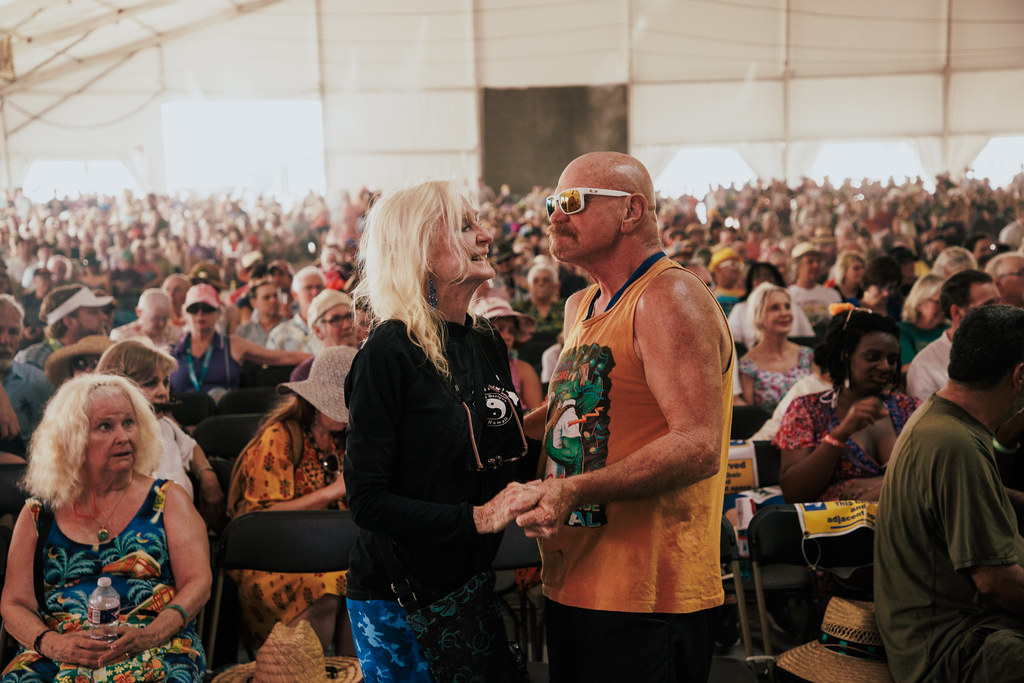
Photo by OffBeat / Noé Cugny

